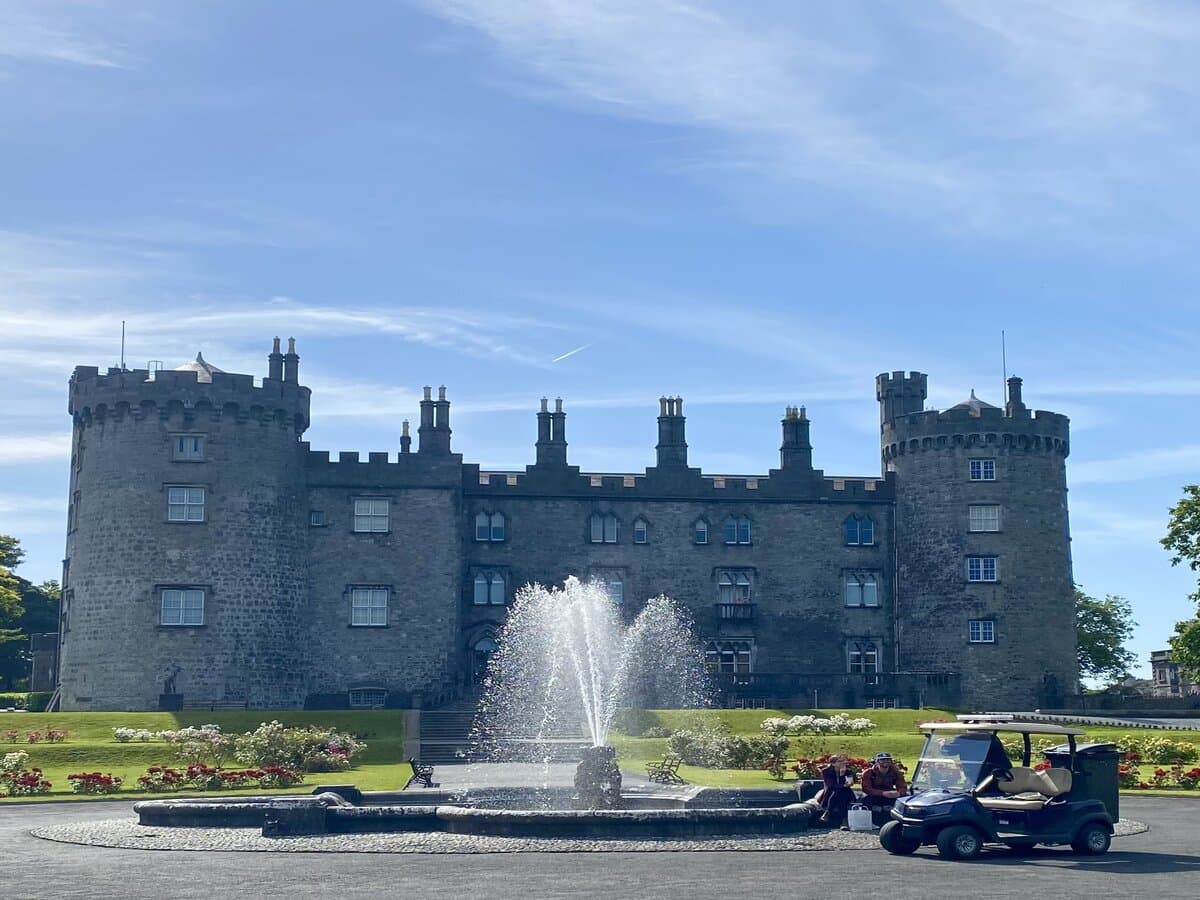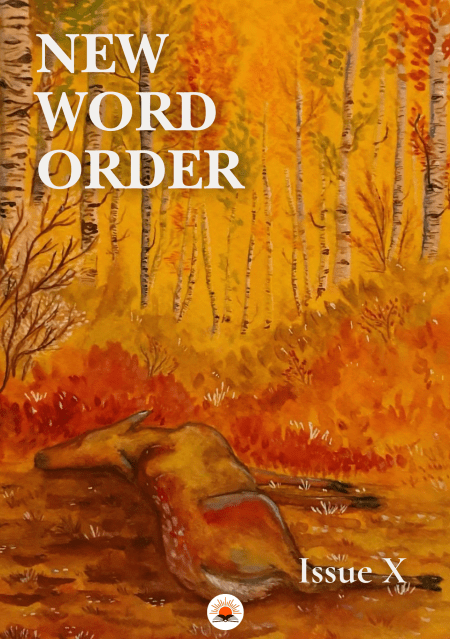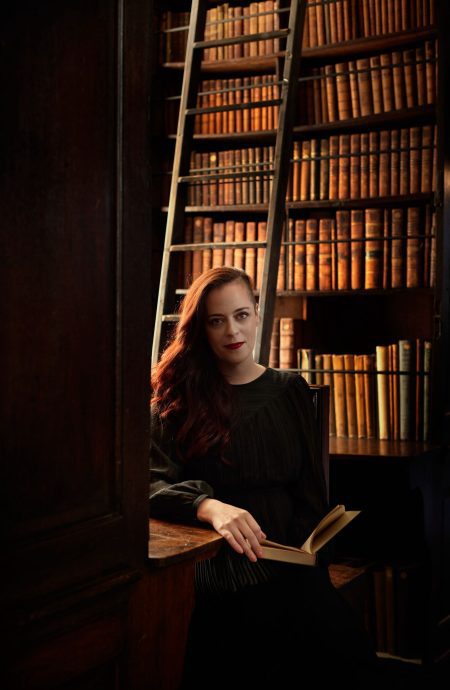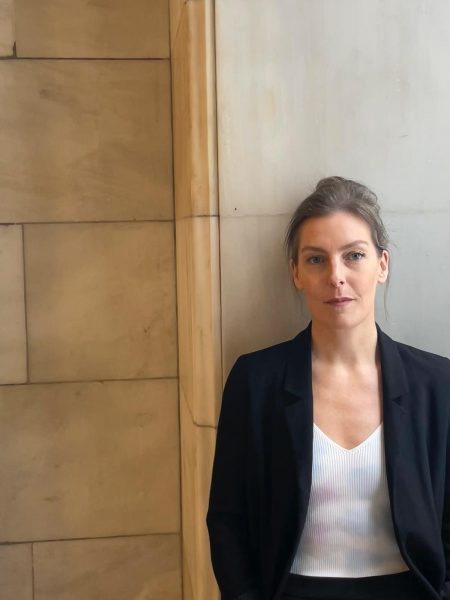by Chris Black (he/him)
Photography by Shreya Ambades.
The house sat empty and unfinished, as though it was a half-drawn design brought to life. The funding for the contract had lapsed most of the way through the build, and it had been left abandoned then. It stood now like the remnant of a dream someone was awoken from too early.
Arin sat in his car on the next street over, sunk down in the driver’s seat, looking out and observing. The neighbourhood had been bare for the past two hours. One might think the entire suburb had been abandoned, but he knew families were nestled together inside the safety and warmth of their homes, protected from the oncoming storm that would sweep the area in a matter of hours. As Arin fixed his gaze on the house, his eyes went dry from a lack of blinking. His mind constructed images of the way he might finish this design and turn it into the perfect home, a place to have the perfect memories. A high pitched beeping rang out in the car. Arin’s visions dissolved before his eyes, as they turned to look at the fuel tank symbol which was flashing red. He switched the car off, taking his keys from the ignition and tossing them onto the passenger seat with a metal clink. The engine died and with it, the whir of the heater. The car sat in silence for a moment. Arin placed his hands over the dashboard, feeling the heat of the car on his palms. He clenched his eyes shut and furrowed his brow. He focused. Soft vibrations flowed from within him, down his arms, into his hands and to the tips of his fingers. The waves of energy got stronger, pouring out of him until his arms began to shake, and then stopped.
He opened his eyes to see the tank symbol glow a soft green. A breath of relief escaped his lips and rose up above his face like a gentle mist. All of the heat that had shrouded the car moments ago had vanished, and his hair raised at the icy touch that now surrounded him. He slowly crept his car closer, crawling to a stop directly opposite the abandoned house. Shrugging on his fleece jacket, he stepped out of his beat-up purple Pontiac into the warmer outside air.
Portridge was an affluent and well-to-do area, which had exploded outwards in recent years with an influx of newly rich families moving to the region. This was just one of many suburbs that had cropped up like a new artery, feeding the heart of the city with commuters and students.
Leaning against the dent in his passenger door he took in the house. It was a “McMansion” like every other house in this suburb, with each house looking like a variation of the same idea. Slight differences between them all gave the impression that they were designed as a collection, like a fashion label’s seasonal garments made for rich consumers with expensive yet unrefined taste. This house which rested on the end of the street looked like a broken and empty shell compared to its gaudy, excessive brethren. Tarp covered scaffolding jutted sharply out from the unfinished parts of the structure. In the yard, the grass was dead and wilted. Gaps where windows should be were haphazardly boarded up. The parts of the house that had a roof bore bald spots where shingles had long since fallen off, and the stone facing that bordered the Palladian windows centred above the grand entrance, had cracked and begun to crumble away.
Arin’s feet slowly passed over the broken stone pathway, as he looked behind him, darting his eyes around and scanning for any voyeurs. The heavy brown door was bolted shut, so Arin slipped around to the back of the house and climbed through a window opening where the floorboards had come loose due to rot.
He came to stand in the main foyer of the house, breathing in the stale smell that clung to the air. Dust danced through the beams of light that shone through gaps in the boards of the portico windows. The handrail of the grand curved staircase stopped abruptly half way down and every step on the stairs was spotted with exposed nails. There were great wounds in the side wall where chunks of plaster had collapsed inwards. Parts of the floor were uncovered by floorboards showing the bare foundations of the house. His footsteps took him to the right, into a great family room that would consist of the dining and living room areas. This would be the place where a family would spend countless hours together, close in their bonds.
This was the right place. He was home. He lay his faded blue jacket down on the floor before sitting upon it. His hands tightly gripped his knees, and with closed eyes he pictured it. He pictured this house the way it ought to look.
He opened his eyes. Furniture decorated the now finished structure of the house. Light caught and glimmered in the glazed glass of the now unboarded windows. A chandelier hung above the foyer, emanating a warm glow. Plants and light fixtures dotted the rooms. An intricate Persian rug led onto a fine mahogany dining table that could seat twelve. The table was already set, and three glasses of wine were waiting to be sipped away. In the kitchen, the cabinets were packed with food. On the marble counter of the island sat a bowl of freshly picked fruit, ready to be eaten. The only sound came from the oven, in which a roast dinner was being prepared for later. The walls remained simple and mostly bare, save for a few empty picture frames where family portraits and photos could go. Next to the front bay window was an easel for Danika. What once was empty and hollow, was now airy and spacious, warm and inviting. Arin’s face relaxed into a smile. It was perfect. But he was far from done yet.
Pausing at the front entrance, he ran his finger over the notches in the door frame, and his nail caught on the indentations in the wood that marked his height at different points in his life so far.
Right below his knee was the first mark.
Arin – age 3
His finger climbed along the door frame up above his eyes.
The last mark reached the top of his head now.
Arin – age 18
His sneakers pounded against the solid limestone footpath, which now matched the face of the home. The path was lined with manicured shrubs, and flatbeds filled with hundreds of red roses and white calla lilies stood out against the vibrant green grass. A sleek new Range Rover stood where his old Pontiac had been, the new black paint job stark against the pavement like an oil slick. The old, rusted keys that were in the passenger seat still brought this new car to life. Arin’s neck twisted back around to look at the house once more, admiring his work.
A vision had become a reality. This house now felt like a home, and it whispered and hummed with life.
Arin swung his body into the driver’s seat and flicked his Albert Einstein bobblehead that had spent the past four years calling the dashboard of his Pontiac home. It was that man, a hero of Arin’s, that had said that energy cannot be created or destroyed, it can only be changed from one form to another. If Einstein was a deity, these words were Arin’s only true religion.
He started the car and pressed on. The Rover was steadier and smoother than his old car as it glided through the streets. The sun began to dip low in the horizon, bathing everything in a golden hue. The streets of the suburb twisted and wrapped around each other like the filament of a lightbulb. As Arin circled the corkscrew, he looked at the same house a hundred times over. At the edge of the development he saw a limp heap of tan fur on the side of the road.
In the rear view he saw what he now knew was the body of a dog. Most likely some drunk teen driving their father’s Benz with just a permit had hit him and left him there. He braked and leapt from the car.
Had someone been watching they would have seen a slight young man place his hands upon the body of a lifeless dog on the side of the road. A minute later they would have seen this same dog leap up into his arms, choking out stifled barks. But no one saw.
The Range Rover barreled down an empty highway going twice the limit. Grey skies had replaced the golden one, and dark clouds were pursuing steadily in the distance. Arin sat at the helm of the car, manning the wheel, and his new friend lapped excitedly at his hands from the passenger seat. The pedal ground against the floor of the car under Arin’s shoe. He had somewhere he needed to be, and the map of the roads he needed to travel took form before him.
***
Echo Park Graveyard was located about an hour and forty-five minute drive from Portridge. That put the city, a few towns, and about 1.5 million people between here and his new home. Close enough, but far away. Exactly why Arin had chosen here. That and the people he came here to meet.
Hunched high up in the branches of an old oak, just inside the grounds of the graveyard, Arin tried to fold up his long limbs to avoid being spotted, and crouched between three large branches about fifteen feet above the roots. It had been a much easier task to hide up in trees when he was younger, and smaller.
He spied the old caretaker, a man of about sixty-five with an arthritic hip, who limped up the uneven and bumpy gravel path. It took him about five minutes to reach the wrought iron gates and chain them closed before leaving for the night. Arin jumped down from the tree, his jacket catching on a stray branch and ripping off a patch that covered one of the moth-eaten holes on his jacket. He dropped to the ground and his legs gave out, landing him on his side. He picked himself up, and then picked up his lost patch. The crimson thread of the lettering spelled out The Portland Timbers, reminding him where he had come here from. He shoved the patch deep into his pocket, and the memory deep into the back of his mind.
Crouching down, Arin quickly manoeuvred through the maze formed by the endless rows of graves, glancing quickly at each headstone. Before long the shape of a name’s outline caught his eye and he doubled back.
Danika Carruthers. That was not a name you could miss. Danika had been a professor of Physics at Howard College before she died tragically in a car accident last year at the age of forty-two. She had never married and had no children. Countless hours of Danika’s life had been dedicated to volunteering and helping others. Painting and sculpture were two of her passions, and she was renowned in the academic world of physics for leading a team of researchers studying Quantum mechanics. Danika was seen as a good, kind and intelligent person by everyone who had the pleasure of knowing her. Arin had learned all of this from reading her obituary. She was ideal.
Arin crouched down at her grave. It was covered in fresh flowers, ornaments, pictures and notes. There were a lot of people that were sorely missing her. He looked around the graveyard once over before placing his hands on her grave. His cheeks burned red when he noticed a note addressed from her sister that was leaning against a potted orchid.
He closed his eyes, and he began.
It had not taken long for Danika, or at least the idea of her, to join him by his side. Everything on the grave had been knocked into a haphazard pile, and Arin took gentle care in rearranging everything exactly as it had been before.
Arin carried on, looking now for someone else. He bounded through the rows, his heart beating to a polyrhythm, and Danika’s form trailed behind. He did not want to look her in the eyes yet. Not while they were still empty.
He looped through the graveyard many times, weaving a pattern in the mud with his footsteps. He passed by Jason Jorgensen’s grave five times and missed it each time before he noticed the ivy that had grown over his headstone, partially obscuring his name.
Like Danika, and many others, Arin had found Jason first through his obituary months ago. From there he researched and cross-referenced, meticulously scratching off names of candidates one by one, until he settled on Jason and Danika, the perfect matches for him.
Jason had been one of three founding partners in a rapidly growing legal firm in the tristate area – Breyer, Mayer and Co. Arin supposed he had been shafted by being left out, since Jorgensen interrupted the melodic flow and catchy rhyme of the firm’s name. He didn’t fit with their aim to get stuck in people’s heads. It seems that was a problem for Jason, an inability to get stuck in anyone’s head, if the empty and unattended grave with overgrown weeds was anything to go by. Of course none of that mattered now, Breyer and Mayer had no issues carrying on without their “Co.” Arin had been drawn to him when he learned that Jason rescued and rehabilitated all kinds of animals. His condo on the outskirts of the city served almost as a covert animal sanctuary, hidden from his landlord. When he had died suddenly from an aneurysm, they found three cats, a pigeon and a squirrel nested in his home. Arin did not know what became of these creatures.
It had stung Arin to read that his funeral had only nine attendees, most of them co-workers. He knew himself what it meant to have no one that he mattered to.
Arin was not going to allow Jason to be forgotten. He was going to matter. He was important.
Again, he crouched to his knees, and placed his hands on Jason’s grave. He pulled from within, straining, able to take only shallow breaths. Arin anchored himself to his surroundings, drawing from the earth around him, from the trees, the bacteria, the water deep in the soil, the movement of every ant and every blade of grass. He looked up at the sky, where the sun had almost disappeared beneath the horizon. Power surged through Arin, icy cold and searing hot all at once, and for a moment, the very sun itself seemed to dim, like a flickering lightbulb.
Keeled over on his hands and knees, Arin struggled for breath as Jason joined Danika behind him. As he braced himself against the headstone, Arin collected himself for a few moments before pushing himself up from his knees and marching onwards without looking back. The storm clouds had begun to roll in from the twilight sky, and the first few drops of rain collected in his hair and stained the shoulders of his jacket a dark blue.
While he darted his way through the latticed footpaths, Danika and Jason trailed behind him as though tethered to him by an invisible chain.
He was ready to leave but stopped dead in his tracks when he saw the face of a beautiful boy looking back at him.To his left, on an older headstone, there was a black and white picture of a boy with piercing eyes that looked directly into Arin’s. His lips were sharp like his cheekbones, but peaked in soft curves. Dark hair fell in waves across his strong brow.
The lettering on the headstone read “Oliver Davis. Beloved. 1916-1936.” He had been only twenty. So young. Never had a real chance at life. Arin used his sleeve and the rain to wipe the picture clear of the dust and grime of lifetimes gone by. The boy was clearer now. His eyes looked to Arin’s and seemed to see him. They beamed with unknowing.
Arin was pulled by a different sort of loneliness now. A longing for a different kind of love, not just that of a family. The rumble of thunder in the distance rang in the heavier rainfall. Rain pelted down, soaking Arin and seeping into the soil.
Arin could not find the will within himself to leave, and he did not push himself to search hard for it. He had to have him.
Arin dropped to the ground and violently dug his hands as deep into the earth as he could. He pulled and pushed from within himself – with and against the world around him. Thunder roared closer now, and a roar escaped his throat to match it. His vision began to blur and narrow. Black spots entered his sight and grew larger. For a moment the rain stopped, as did the thunder, and a brightness opened up in the sky above. Then the blackness consumed him.
Arin awoke, lying on his back in the soil of the grave. His vision adjusted and made out three shadow figures looming above him. He pushed himself up on his elbows. Before him stood Danika and Jason, and Oliver. The three of them were still, and staring into the distance like statues with unfixed gazes.
His body sank in relief, his neck dropping the weight of his head and letting it fall back to look up at the storm that still raged above them.
Back in the car, safety was found within its warm confines. In the rearview mirror he looked at his new parents, who stared ahead with vacant and dormant eyes. The dog sat curled in Oliver’s lap in the passenger seat. They all just needed to sleep and regain their full energy. Then their new lives could begin tomorrow.
Arin started the car and began the journey back to their new home. The headlights guided the way through the pitch black. He stared at the mud caked in his fingernails and smiled to himself as he thought of his neighbours welcoming himself, his parents and his boyfriend into their community.
As they pulled into the suburb, the sun began to rise again, showing clearly the path forward. They would fit in nicely in Portridge. This was exactly what he needed, what they all needed.
A fresh start.
This time, it would work.
This time, it would be different.
Chris Black
Like many writers, Chris has loved reading and storytelling since he was very young. He has spent a good portion of his life getting lost in stories. Being gay, he has often found himself on the outside looking in, having to relate to most mainstream stories that he couldn’t always exactly see himself reflected in. As far back as he can remember he has always wanted to see stories about people like him. Stories he could see himself and his own life in. There were not many options of stories where boys like him existed, and the options that were there tended to be tragic in their storytelling. He longed to see gay characters live adventurous, interesting, and joyful lives, like the straight characters did in the stories he loved to read. This pushed him to write the kind of stories he had always wanted to read throughout his life. Being gay is a part of his human experience, and it is a part of the human experience he likes to bring to life in his storytelling. He usually doesn’t want to write coming out stories or stories that revolve around the character’s sexual identity. In his stories, the gay character’s sexuality is inconsequential, not a big deal and is simply allowed to exist. These are the kinds of stories he prefers to both read and write.



